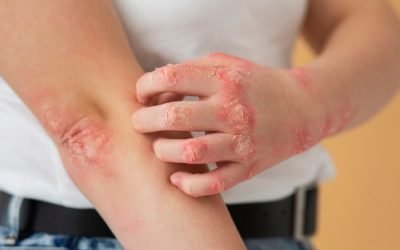Home » Eczema Rash Treatment
Eczema Rash Treatment

book your appointment

Understanding Eczema: Causes and Symptoms
Eczema, also known as atopic dermatitis, is a chronic skin condition characterized by inflamed, itchy, and red skin. It can affect people of all ages but is more common in children. The exact cause of eczema is unknown, but it is believed to result from a combination of genetic and environmental factors. Common triggers include allergens, stress, irritants, and changes in weather.
Causes of Eczema
Eczema can be caused by a combination of factors. Here are the main ones:
Genetics: If your family has a history of eczema, asthma, or allergies, you’re more likely to have it too. It’s something you might inherit from your parents.
Immune System: If your immune system is overactive, it can cause your skin to react strongly to minor irritants or allergens.
Environment: Things around you like pollen, smoke, or pet dander can trigger eczema. Weather changes, especially extreme heat or cold, can also make it worse.
Skin Barrier: Your skin acts as a barrier to keep moisture in and irritants out. If this barrier is weak, your skin loses moisture and gets easily irritated.
Stress: Emotional stress can sometimes make eczema flare-ups worse.
Irritants: Soaps, detergents, shampoos, disinfectants, juices from fruits or meats, and certain fabrics can irritate your skin and cause eczema.
Symptoms of Eczema:

Eczema symptoms can vary, but here are the most common ones:
Itchy Skin: The itchiness can be intense, especially at night. Scratching can lead to more irritation and even infections.
Red Patches: These can appear anywhere on your body but are most common on the hands, feet, ankles, wrists, neck, upper chest, eyelids, and inside the bend of your elbows and knees.
Dry, Sensitive Skin: Your skin can feel dry, rough, and sensitive. It might crack and peel.
Swelling: Inflammation can cause your skin to swell up.
Small, Raised Bumps: These can leak fluid and crust over when scratched.
Thickened, Scaly Skin: Constant scratching or rubbing can cause your skin to become thick and leathery over time.
Comprehensive Eczema Treatment at The House of Skin
Dr. Parwaaz Matharoo at The House of Skin in Ludhiana specializes in providing comprehensive eczema treatment tailored to individual patient needs. With a focus on evidence-based practices and personalized care, Dr. Matharoo ensures that each patient receives the highest quality treatment.
Treatment Approaches:
- Topical Treatments: The use of medicated creams and ointments to reduce inflammation and relieve itching.
- Phototherapy: Exposure to ultraviolet light under medical supervision to reduce symptoms.
- Systemic Medications: Oral or injectable medications for severe cases of eczema.
- Moisturizers: Regular use of emollients to keep the skin hydrated and reduce flare-ups.
- Lifestyle and Home Remedies: Guidance on avoiding triggers, proper skincare routines, and dietary adjustments.
Types of Eczema: A Comprehensive Overview
Eczema can appear in several forms, each with its own unique symptoms and triggers. Understanding these types can help in identifying and treating the condition more effectively.
- Atopic Dermatitis: The most common form, often starting in childhood and linked with other allergies like asthma.
- Contact Dermatitis: Occurs when the skin reacts to direct contact with an irritant or allergen, causing redness and itching.
- Dyshidrotic Eczema: Features small, itchy blisters on the hands and feet.
- Nummular Eczema: Appears as coin-shaped, itchy spots on the skin.
- Seborrheic Dermatitis: Affects oily areas like the scalp and face, leading to flaky patches and redness.
- Stasis Dermatitis: Develops on the lower legs due to poor blood flow, causing swelling, redness, and itching.

Preventing Eczema Flare-Ups
Preventing eczema flare-ups involves identifying and avoiding triggers, and maintaining good skin care habits. Here are some simple tips:
- Identify Triggers: Common triggers include allergens (like pollen and pet hair), irritants (like soaps and detergents), stress, and weather changes. Keeping a diary can help identify what triggers your eczema.
- Moisturize Regularly: Keep your skin hydrated by using fragrance-free moisturizers several times a day, especially after bathing.
- Gentle Skincare Products: Use mild, soap-free cleansers and avoid products with alcohol, fragrances, or harsh chemicals.
- Wear Soft Fabrics: Choose clothing made of soft materials like cotton and avoid scratchy fabrics like wool.
- Manage Stress: Stress can trigger eczema, so practice relaxation techniques like yoga, meditation, or deep-breathing exercises.
- Healthy Diet: Eat a balanced diet rich in omega-3 fatty acids, which can help reduce skin inflammation.
Children and Eczema: Special Considerations
Children with eczema need extra care to manage their symptoms and prevent flare-ups. Here are some important tips:
- Gentle Bathing: Bathe your child in lukewarm water using mild, fragrance-free soap, and keep bath time short to avoid drying out their skin.
- Regular Moisturizing: Apply a thick moisturizer immediately after bathing to lock in moisture.
- Avoid Triggers: Identify and avoid triggers such as certain foods, allergens, and irritants. Keep the child’s environment clean and free of dust mites and pet dander.
- Comfortable Clothing: Dress your child in soft, breathable fabrics like cotton. Avoid wool and synthetic materials that can irritate the skin.
- Managing Scratching: Keep your child’s nails short and consider using soft mittens at night to prevent scratching and further irritation.
- Healthy Diet and Hydration: Ensure your child drinks plenty of water and eats a balanced diet to support their overall skin health.
- See a Specialist: Regular check-ups with a pediatric dermatologist can help manage the condition effectively and provide tailored treatment options.
Dietary Considerations for Eczema Patients
Diet plays a significant role in managing eczema. Some foods can trigger flare-ups, while others can help reduce inflammation and promote skin health. Here are some key points to consider:

- Identify Food Triggers: Certain foods can trigger eczema symptoms. Common culprits include dairy, eggs, nuts, soy, and gluten. Keeping a food diary can help you identify any foods that cause flare-ups.
- Anti-inflammatory Foods: Incorporate foods that reduce inflammation. These include:
- Omega-3 Fatty Acids: Found in fish (like salmon and mackerel), flaxseeds, chia seeds, and walnuts. Omega-3s can help reduce inflammation and improve skin health.
- Fruits and Vegetables: Rich in vitamins, minerals, and antioxidants, which help protect the skin and reduce inflammation. Aim for a colorful variety to get a range of nutrients.
- Probiotics: Found in yogurt, kefir, sauerkraut, and other fermented foods, probiotics can help balance gut bacteria and may improve eczema symptoms.
- Hydration: Drink plenty of water throughout the day. Staying hydrated helps keep your skin moisturized from the inside out.
- Avoid Processed Foods: Processed foods often contain additives, preservatives, and unhealthy fats that can trigger inflammation and exacerbate eczema symptoms.
- Balanced Diet: Ensure your diet is well-balanced, providing all the necessary nutrients to support overall health and skin integrity. Include a mix of lean proteins, whole grains, healthy fats, and plenty of fruits and vegetables.
- Consult a Nutritionist: If you suspect food allergies or need help planning a diet that supports your eczema management, consider consulting a nutritionist or dietitian. They can provide personalized advice and create a diet plan tailored to your needs.
By paying attention to your diet and making healthy food choices, you can help manage eczema symptoms and improve your overall skin health.
When to See a Dermatologist for Eczema

While many eczema cases can be managed with over-the-counter treatments and lifestyle changes, there are times when you should see a dermatologist:
- Severe Symptoms: If the eczema is severe, causing a lot of discomfort, or covering large areas of the body, it’s essential to seek professional help.
- Persistent Eczema: If symptoms persist despite using over-the-counter treatments and home remedies, a dermatologist can provide stronger medications and advanced treatment options.
- Signs of Infection: If the affected skin becomes red, swollen, warm, or starts oozing pus, it may indicate an infection that needs medical attention.
- Impact on Daily Life: If eczema is significantly affecting your sleep, work, or daily activities, a dermatologist can help manage the condition more effectively.
- Need for Specialized Treatments: Dermatologists can offer treatments like prescription creams, light therapy, and stronger medications not available over the counter.
- Allergy Testing: If an allergy is suspected as a trigger, a dermatologist can perform tests to identify specific allergens and recommend avoidance strategies.
Research and Evidence-Based Care
Dr. Parwaaz Matharoo ensures that all treatments are backed by the latest research and clinical guidelines. By staying updated with advancements in dermatology, Dr. Matharoo provides patients with the most effective and safe treatment options. Credible sources such as the American Academy of Dermatology (AAD) and the National Eczema Association (NEA) inform the treatment protocols at The House of Skin.
Patient-Centered Care
At The House of Skin, the focus is on delivering patient-centered care. This means listening to patients’ concerns, understanding their specific needs, and involving them in the decision-making process. Dr. Matharoo believes in educating patients about their condition and treatment options to empower them to manage their eczema effectively.
Optimizing Treatment with Modern Technology
The House of Skin is equipped with state-of-the-art technology to ensure precise diagnosis and treatment. Advanced diagnostic tools help in identifying the root causes of eczema, and cutting-edge treatments provide relief and long-term management of the condition.

Technological Advancements:
- Digital skin analysis
- Advanced phototherapy units
- Personalized skincare solutions
Educational Resources and Support
Dr. Parwaaz Matharoo is committed to educating patients and the community about eczema. The House of Skin provides access to various educational resources, including informational brochures, workshops, and online content, to help patients better understand and manage their condition.
Educational Initiatives:
- Regular workshops on eczema management
- Informative blog posts and articles
- Patient support groups
FAQs about Eczema Treatment
Eczema, or atopic dermatitis, is a chronic skin condition characterized by inflamed, itchy, and red skin. It is believed to result from a combination of genetic and environmental factors, including allergens, irritants, stress, and weather changes.
Eczema is usually diagnosed through a physical examination of the skin and a review of the patient’s medical history. In some cases, patch testing or skin biopsies may be performed to rule out other conditions.
Common symptoms include dry, sensitive skin, intense itching, red or inflamed skin, dark patches, rough or scaly patches, oozing or crusting, and swelling in affected areas.
Preventing flare-ups involves identifying and avoiding triggers such as certain foods, allergens, and irritants. Regularly moisturizing the skin, using gentle skincare products, managing stress, and wearing soft fabrics can also help.
Treatments include topical creams and ointments, phototherapy, systemic medications, regular moisturizing, and lifestyle changes. The specific treatment plan depends on the severity of the condition and individual patient needs.
Conclusion
Eczema can be a challenging condition to manage, but with the right care and treatment, patients can lead a comfortable and fulfilling life. Dr. Parwaaz Matharoo at The House of Skin in Ludhiana offers expert, research-backed, and patient-centered eczema treatment. If you or a loved one is struggling with eczema, contact The House of Skin today to schedule a Book an Appointment Today!
Get Consultation With Our Experts
Schedule a consultation today and embark on a journey towards informed decision-making and success. Your challenges, our expertise – let’s collaborate for a brighter future.
